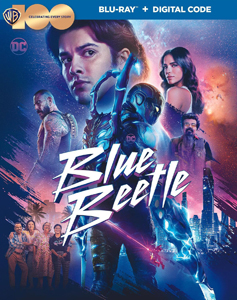DC cared enough about protecting the brand of “Batgirl” that it scrapped a completed movie so the public wouldn’t see a bad “Batgirl” movie. But it had no such consideration for “Blue Beetle” (now on HBO Max), a monstrosity of mediocrity caught between studio product and confused auteur vision.
Director Angel Manuel Soto’s film adapts a 1939 Fox Comics creation into what casual viewers will assume is a knock-off of Marvel’s “Spider-Man” (which debuted later), spiced with elements of other superhero hits. It has an identical setup to “Spider-Man: Homecoming” (2017), with Jaime (Xolo Maridueña) learning about the Blue Beetle suit on the fly as its AI voice gives him instructions.
Jaime is a good dude, and Mariduena reads as a nice guy – the same as on “Cobra Kai,” an excellent show that understands nostalgia and POV storytelling enough to get the best out of novice actors. Mariduena is good there as the Gen-Z straight man reacting to William Zabka’s Johnny, who doesn’t know or care that he’s hilariously stuck in the Eighties.
“Blue Beetle” (2023)
Director: Angel Manuel Soto
Writer: Gareth Dunnet-Alcocer
Stars: Xolo Maridueña, Bruna Marquezine, Becky G
In “Blue Beetle,” Mariduena is asked to be an action star and romantic lead without any such behind-the-scenes help. The Beetle suit – actually a symbiote controller and voice in his head like in “Venom” – “chooses” Jaime, which is fair enough because he’s a great kid worthy of being a Chosen One.
A freshly minted college graduate, he wishes he could financially help his sprawling Mexican-American family in the Edge Keys (presumably in Florida, and – as I look for something positive – it must be said that the film has a nice neon-plus-palm-trees aesthetic).
A good kid learns to be … um … a good kid
This gives our main character no arc – he goes from great kid to great kid. The script has him romancing Jenny Kord (Bruna Marquezine) in a gender-swapped “West Side Story.” Way on the other side of the tracks, she’s the niece of corporate bigwig Victoria Kord (Susan Sarandon), but disposed to good deeds rather than cutting-edge weapons production.
This romance might’ve rung true at the end of Jenny and Jaime being put through their paces, but – after she shows him the dusty old lair of her father, the original Blue Beetle (such a low-grade superhero that Superman and Batman don’t know he existed) – they go on separate narratives of action sequences.

Another movie “Blue Beetle” wishes it could be is “Shang-Chi and the Legend of the Ten Rings” (2021). That it targets a mid-range MCU movie for emulation says something about “Beetle’s” stultifying mediocrity. “Shang-Chi” balances mild Asian-American stereotypes with the safe-for-wide-consumption portrayal of assimilated Asian-Americans. Though ultimately bloated, it has quirkiness and good action.
We can see “Blue Beetle” trying for respectful Mexican-American wackiness, while in terms of action it settles for CGI-driven flying fights between two suited characters (Raoul Max Trujillo’s Carapax is the bad-guy version of BB). The Awkwafina stand-ins are supposed to be truck-loving conspiracy theorist Uncle Rudy (George Lopez) and sister Milagro (Belissa Escobedo). But the actors can do little to force something that’s not genuinely in Gareth Dunnet-Alcocer’s screenplay, and they disappear for long stretches amid the overstuffed character roster.
“Beetle” emphasizes family so much that you’d think Vin Diesel was a script consultant, but it doesn’t develop the family members till late in the game, if at all. The mother never gains a trait, and the grandmother’s quirky secret is supposed to be hilarious but it’s just kinda weird. The dad is a Yoda type, and in all cases I sense these actors must be good in other things.
What would you do for a paycheck?
For the bigger-name actors, “Blue Beetle” is an exercise in finding a tone that will make sense for this mess of unoriginality trying to pass as a statement on Mexican-American family bonds amid financial plight. Notably, we see this from poor (as in “unfortunate”; no doubt her coffers were nicely filled) Sarandon, whose villain makes no sense. Sarandon plays Victoria like a cartoon, an understandable choice because Victoria can’t exist in the real world.
She’s pure sociopathic evil – given free rein to kill innocent people by every legal check-and-balance — but says things like “It’s for the greater good” as if trying to fool herself. She inspires loyalty among her charges, but we don’t know why (an off-screen explanation might be extremely good pay and benefits), since she treats them all like garbage. The film does, too, making a fart joke out of a pivotal action sequence wherein a Beetle tank skewers soldiers to death.
In one sequence that’s not horrible – there are a few, but they don’t stick to each other to form a quality whole – a tragic-henchman flashback explains how Carapax ended up under Victoria’s thumb. Even so, the evil (including an attempt to execute Jaime’s whole family via machine guns – for no reason other than evil) carried out by these working stiffs is incredible.
“Blue Beetle” isn’t so bad that it doesn’t know what it’s doing. Both Carapax and Kord lab assistant Sanchez (that’s not actually his name; Victoria is simply racist) do eventually question whether the (presumably) generous pay is worth the psychological abuse and a job description that includes “After we get what we need, kill him” once a day. It’s just bad at making us believe these extreme yet cliched situations could unfold, even in a comic-book universe.
As the movie often includes good needle-drops – “Guardians of the Galaxy”-type classics and Latin club thumpers – a viewer can imagine cooler stuff unfolding in front of the cool sounds, and I reflected on this among one last catchy song over the closing credits. “Blue Beetle” has an uncanny way of being mediocre-to-bad while always hinting at what a better version might be like.

